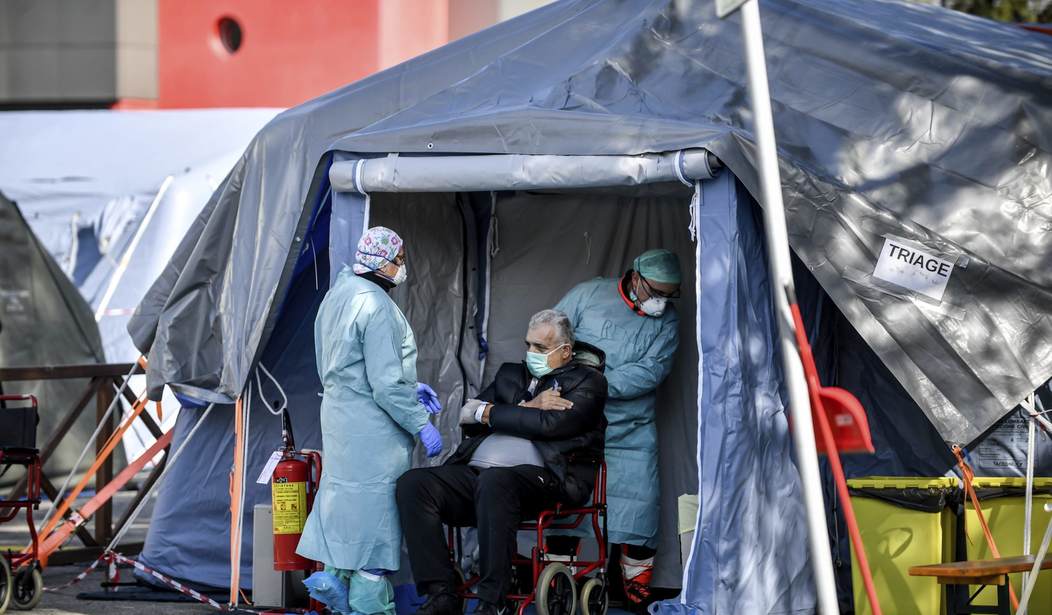Health officials in Italy have issued guidelines for rationing care as hospitals there struggle to keep up with the surge of patients infected with the coronavirus. Doctors are being told that they’ll likely need to deny care to senior citizens and those with other health conditions as the virus explodes across the nation.
Italy has been rocked by the still not-well-understood COVID-29, with more than 12,000 confirmed cases and 827 deaths at publishing time—second only to China—and 16 million residents currently under quarantine.
An article published by the Italian College of Anesthesia, Analgesia, Resuscitation and Intensive Care (translated here by Yascha Mounk) warns that “It may be necessary to establish criteria of access to intensive care not just on the basis of clinical appropriateness but inspired by the most consensual criteria regarding distributive justice and the appropriate allocation of limited health resources.” The report goes on to recommend rationing care to certain populations.
Rationing health care is nothing new in Italy and in fact has become an “established trend” in recent years amid an ongoing economic crisis that has strained government resources, including the government-run healthcare system.
“In a context of grave shortage of medical resources, the allocation criteria need to guarantee that those patients with the highest chance of therapeutic success will retain access to intensive care. It’s a matter of giving priority to ‘the highest hope of life and survival,'” the health experts explain.
“It may become necessary,” they warn, “to establish an age limit for access to intensive care.”
So if your Italian grandma shows up at the ER in need of care, she may just be given some cough syrup (or a pain pill) and sent home to die. With a shortage of hospital beds and doctors working themselves to the point exhaustion, hospitals have no other choice but to triage patients and only provide care to the most viable.
The medical society denies that they’re asking doctors to make a “value judgment” (of course they are) but rather it’s “a way to provide extremely scarce resources to those who have the highest likelihood of survival and could enjoy the largest number of life-years saved.”
In the event of a “total saturation of resources,” a policy of “first come, first served” would exclude patients who show up later, they explain.
But it’s not just your grandma who needs to worry about this survival-of-the-fittest policy: “In addition to age, the presence of comorbidities [additional chronic conditions] needs to be carefully evaluated. It is conceivable that what might be a relatively short treatment course in healthier people could be longer and more resource-consuming in the case of older or more fragile patients.”
So if you’ve got diabetes or a heart condition and show up at the hospital with coronavirus, you might not be worth saving because you’ll consume too many (increasingly scarce) resources and doctors may be forced to “posit a ceiling of care” (Orwellian language if I ever heard it) and you might be out of luck.
And that’s exactly what’s happening in Northern Italy, where the rationing has begun. A doctor in Western Europe described the dire situation doctors and patients face there and the chilling decisions medical professional are being forced to make:
Most of my childhood friends are now doctors working in north Italy. In Milan, in Bergamo, in Padua, they are having to choose between intubating a 40-year-old with two kids, a 40-year old who is fit and healthy with no co-morbidities, and a 60-year-old with high blood pressure, because they don’t have enough beds. In the hallway, meanwhile, there are another 15 people waiting who are already hardly breathing and need oxygen.
Northern Italy has been hit particularly hard by the coronavirus, with doctors reporting conditions we usually associate with wartime, as the death toll increases by the hour and hospitals are short-staffed and out of beds.
Dr. Daniele Macchini, who works at the Humanitas Gavazzeni hospital in Bergamo, described the conditions in a lengthy Facebook, saying “The war has literally exploded and the battles are uninterrupted day and night.”
“One after the other the unfortunate poor people come to the emergency room,” he wrote. “Now, however, that need for beds in all its drama has arrived. One after another, the departments that had been emptied are filling up at an impressive rate. The display boards with the names of the sick, of different colors depending on the operating unit they belong to, are now all red and instead of the surgical operation there is the diagnosis, which is always the same cursed: bilateral interstitial pneumonia.”
Macchini called the epidemic a “tsunami that has overwhelmed us.”
“Suddenly the emergency room is collapsing,” he continued. “Emergency provisions are issued: help is needed in the emergency room. A quick meeting to learn how the first aid management software works and a few minutes later they are already downstairs, next to the warriors on the war front.”
The symptoms are always the same: fever, difficulty breathing, cough, respiratory failure. “All to be hospitalized. Someone already to intubate and go to intensive care. For others it is late …Intensive care becomes saturated, and where intensive care ends, more are created.”
It’s a nightmare scenario, something out of a dystopian novel, and Italy’s healthcare system is collapsing under the weight of it. If this chaos spreads to other regions, COVID-19 could make its way onto the list of the world’s most deadly plagues. Pray they get control of this in Italy and elsewhere—and fast.










Join the conversation as a VIP Member